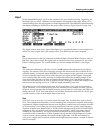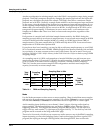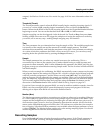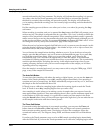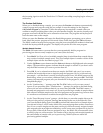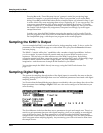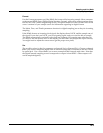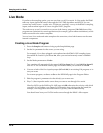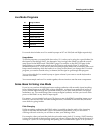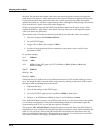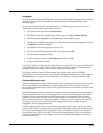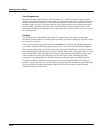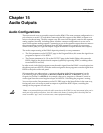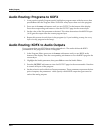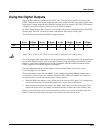
Sampling and Live Mode
Live Mode
14-11
Live Mode Programs
Live mode also includes two Live mode keymaps at 197 and 198 (Left and Right respectively).
Usage Notes
To use the programs, you must hold down a key (C 4, unless you’re going for a special effect) for
the inputs to run through VAST. An alternative way to trigger the sound is to edit the control
setup found in the MIDI-mode TRANSMIT page. For example, on the SWITCH page in the
Setup Editor, you could set the switch type (SwType) to note toggle (Note T), and set the
destination (Dest) to C 4. This allows you to turn the program on and off via a button press, and
keeps sound sustaining while the button is on. Keep in mind that if you change the Live mode
program, you need to restrike a key (or button) for the signal to go through that program.
You can also edit the Live mode keymap to ignore release if you want to use the keyboard to
activate Live mode.
You cannot sample and use Live mode together, the two functions use the same components.
Some Ideas for Using Live Mode
If you’ve ever used an old-fashioned mono analog synthesizer with an audio input (anything
from a Moog Rogue to an ARP 2500 or Serge Modular), you know how much fun it can be to
pass a musical signal through the synth and modify it in real time with the filters, envelopes,
modulators, etc. Live mode brings that concept to digital synthesis, and lets you use all of the
power of the K2661 on any kind of input signal.
For starters, you can simply hook up a CD player to one of the K2661’s sampling inputs, get a
bunch of your favorite CDs, and start fooling around. (A turntable works well too.) Here are
some ideas for going further:
Pitch Changing
Unlike an analog synthesizer, the K2661 makes it possible to alter the pitch of the incoming
signal in real time. But the K2661 is not a conventional pitch shifter, so if you are used to
working with such a device you will have to alter your thinking a little.
For example, when you bend the pitch down from the unity pitch (C 4), using a VAST function,
it slows the playback of the incoming signal, but it doesn’t change the rate at which the signal is
coming in—your CD is still spinning, and putting out a constant audio signal. So as you lower
ID Program Name
740 LM VirtualDesk 1
741 LM VirtualDesk 2
742 LM EQ Room Hall
743 LM TubeAmp_ Gtr
744 LM Synth Sliders
745 LM EQ StIm Hall
746 LM ParaFlange
747 LM EQ Overload
748 LM Filters
749 LiveMode Default



